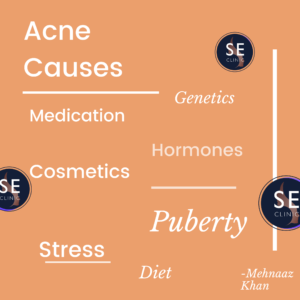
Although acne is common between the age of 12-24 years it is not uncommon to see it across different age groups. It is characterised by an oily, blemish-prone skin which can sometimes be tender and painful to touch.
There are a lot of myths and unconfirmed causes of acne however the most well-known causes of acne are as follows:
Hormonal Imbalances –This is the most commonly associated cause of acne. Many women will experience acne during pregnancy or a few days before their menstrual cycle or due to Polycystic Ovarian Syndrome (PCOS). Higher levels of sex hormones during puberty similarly increase the risk of acne. Hormonal changes can cause the oil-producing glands in our body overproduced oil (sebum) on our skin. This overproduction can lead to pores clogging and being infected by bacteria which can trigger an inflammatory process in the affected oil glands or hair follicles leading to the formation of blackheads, whiteheads, pustules, papules or cysts.
Genetics– Acne can run in the family without any clear cause
Medication–Certain medicines such as progesterone-only pills (contraception), steroid (topical and anabolic), lithium, anti-epileptics, immunosuppressants such as ciclosporin, azathioprine and biologic medicines can affect your hormonal balance and trigger acne.
Cosmetics-Cosmetics such as moisturisers, foundations and hair pomades can be comedogenic. Selecting the right products is key.
Stress– There is some evidence that stress can worsen acne. This is because stress is known to affect hormones that can, in turn, affect sebum production.
Diet-Some evidence suggests that diets high in dairy, proteins, fats and sugar can increase the risk of acne due to the effect it may have on your hormone production and insulin sensitivity.
When To Seek Medical Advice
Acne has different severities and in most cases mild to moderate forms of acne can be treated using topical skincare products, lifestyle changes and good self-care. However, the more severe form of acne needs medical intervention and a referral to a dermatologist for further investigation and prescription-only medication (oral and/or topical) and require a dermatology referral.
If you have mild acne, speak to a pharmacist about over-the-counter medicines or trained aesthetic healthcare professional who can offer medical-grade skincare if over-the-counter medicines do not help. If these do not control your acne, or it’s making you feel very unhappy, see a GP.
You should see a GP if you have moderate or severe acne or you develop nodules or cysts, as they need to be treated properly to avoid scarring. (Source: www.nhs.net)
